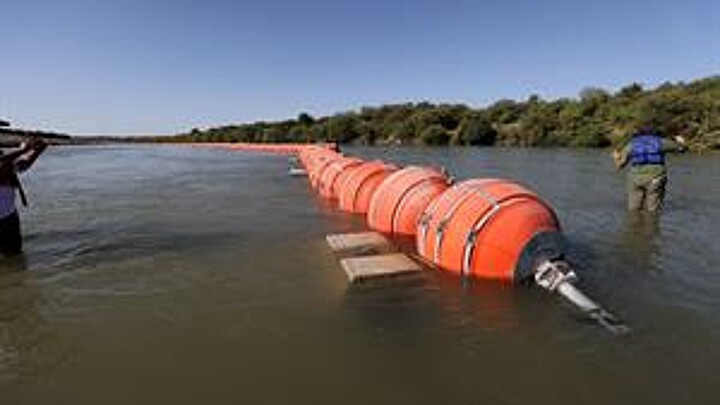Border
AGs push back against 'absurd effort' to thwart border security efforts in Texas
The U.S. Fish and Wildlife Service has proposed listing the prostrate milkweed (Asclepias prostrata), a wildflower, as an endangered species under the Endangered Species Act
April 21, 2022 4:38pm
Updated: April 22, 2022 2:26pm
The attorney generals of Texas and Missouri are pushing back against what they say is another attempt by the Biden administration to thwart border security efforts in Texas, this time through the Endangered Species Act.
The U.S. Fish and Wildlife Service has proposed listing the prostrate milkweed (Asclepias prostrata), a wildflower, as an endangered species under the Endangered Species Act. It’s also proposed designating 691.3 acres in two Texas border counties, Starr and Zapata, as critical habitat for the milkweed under the Act.
According to the agency, “All known Texas populations of prostrate milkweed are within 9 miles (14.5 km) of the Texas-Mexico border. To address border security concerns, additional border barrier construction was proposed in the Rio Grande Valley, including the Arroyo Morteros tract of the Lower Rio Grande Valley NWR. Should border wall construction occur, and depending on the alignment, construction could remove prostrate milkweed plants that occur within the construction footprint.”
The acreage includes areas in Texas where federal, state and local law enforcement officers are implementing border security efforts, including through Texas’ Operation Lone Star. The initiative has provided vital resources to local law enforcement combating increased cartel-driven crime and an influx of illegal immigration. Any attempts to stop these efforts would be detrimental, local and state authorities argue.
Texas Gov. Greg Abbott also issued disaster declarations, which are still in effect, for Starr and Zapata counties due to the “surge of individuals unlawfully crossing the Texas-Mexico border” who posed an “ongoing and imminent threat of disaster.”
“This absurd effort to paralyze Texas’s border control by putting a plant before the lives of Texans is another display of cowardice from the Biden Administration,” Texas Attorney General Ken Paxton said in a statement.
“The Biden Administration appears to be using any means necessary not to build the Southwest border wall – that’s why our lawsuit is so important,” Missouri Attorney General Eric Schmitt told The Center Square.
Congress authorized and allocated funding for construction of the border wall, which President Joe Biden halted via executive order last year. Department of Homeland Security Secretary Alejandro Mayorkas later announced a range of immigration-related policy changes, including redirecting border wall funds to be spent on environmental projects.
While construction of the federal wall was halted, Texas began building its own border wall on Texas land, starting last December in Rio Grande City.
AG Paxton has sued the administration multiple times related to immigration. He’s also sued twice with Schmitt, including over border wall construction being halted.
Paxton sent a letter to FWS during the public comment period, which ended April 18, opposing its plan.
He points to thorough environmental analyses previously conducted by federal agencies that found the impact of border enforcement activities or border barrier construction was of minimal or no significance to the milkweed.
“Yet, these environmental studies are seemingly being ignored by FWS and now without clear reasoning or supportive data, the impact of border enforcement activities or a border wall are said to be potential threats of ‘high magnitude’ to the prostrate milkweed,” Paxton said.
Likewise, the milkweed can be replanted in other areas. Many gardeners plant them as a way to attract butterflies. Texas Parks and Wildlife has identified 36 species of the plant, both native and non-native to Texas, identifying regions of the country where it grows.
In its filing with the Federal Register, the FWS states that while “two proposed units of critical habitat are located along the border, we do not anticipate that there will be an impact on national security or homeland security.”
Instead, it claims there’s potential “habitat loss from border security development and enforcement activities” necessitating the special status for the plant.
But Paxton said “the increased influx of illegal aliens through the designated habitat, without a border wall, will actually do more harm to the plant.”
More than 100,000 illegal immigrants have been caught trespassing in the U.S. every month, according to recent CBP data. Additionally, Border Patrol agents are expected to process more than 2 million people entering the southwest border by the end of the fiscal year. Border counties, especially, are suffering from increased cartel-driven crime – from increased high-speed vehicle chases, to increased drug and human trafficking.
“One would hope that saving a person from being trafficked by allowing for sufficient border enforcement activities, in addition to implementing some sort of border barrier, would outweigh the designation of a plant species as endangered or habitat as critical, especially considering other federal agencies have concluded … that the prostrate milkweed would not be threatened by such activity,” Paxton argues.
When it comes to securing the border, Schmitt said, “If the Biden Administration won’t take action to secure the border, Missouri and Texas will."
“This wall will be built,” Paxton said. “Congress approved funding for this wall, and these cynical efforts to further burden the state of Texas will not stand.”









